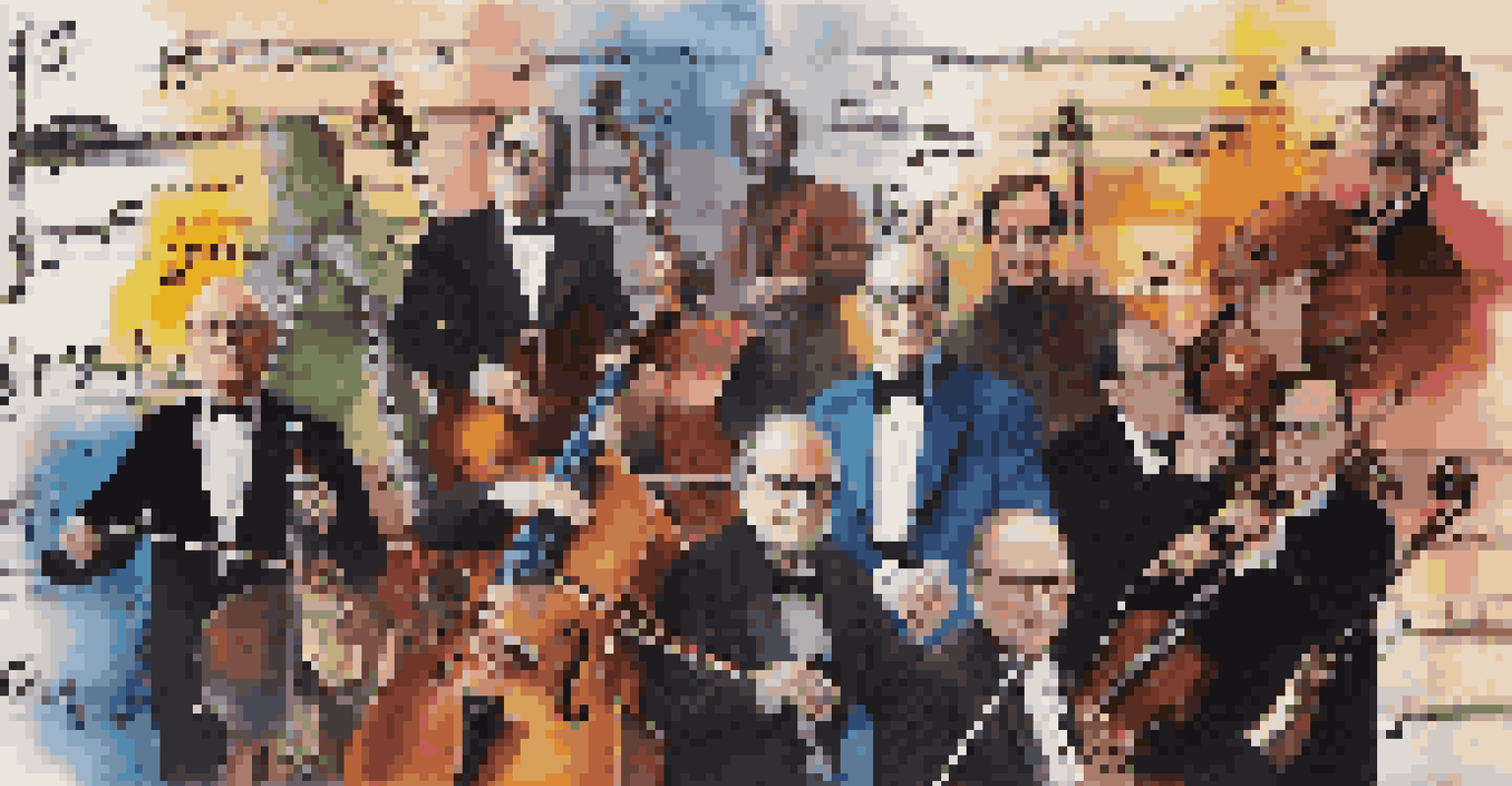Exploring the World of Film Scoring: Composing for Cinema

What is Film Scoring and Why Does It Matter?
Film scoring is the art of composing music specifically for films, enhancing the emotional and narrative depth of a movie. Imagine watching a thrilling chase scene without the pulse-pounding score; it would feel incomplete. Music in film not only sets the tone but also helps convey characters' emotions and plot developments, making it a vital component of storytelling.
Music is the shorthand of emotion.
The right score can elevate a scene from mundane to memorable, often becoming inseparable from the film itself. For instance, John Williams' iconic score for 'Star Wars' is a perfect example of how music can define a cinematic experience. Without the stirring orchestration, the franchise would surely feel different, showcasing the significant role of film scoring.
In essence, film scoring is more than background music; it's an integral force that shapes how audiences perceive and feel about the story unfolding on screen. As viewers, we often might not recognize how much we rely on these scores to guide our emotional responses during a film.
The Process of Composing a Film Score
Composing a film score is a collaborative and iterative process that begins with understanding the film’s narrative and emotional arcs. Composers often work closely with directors to capture the vision of the story, discussing themes, moods, and key moments that require musical emphasis. This partnership is crucial, as the composer needs to align their vision with the director's artistic intent.

Once the groundwork is laid, composers typically create thematic materials that resonate with the characters or story elements. For example, a heroic character might have a bold, uplifting theme, while a villain may be accompanied by darker, more ominous motifs. These themes are then developed throughout the film to provide continuity and emotional depth.
Film Scoring Enhances Storytelling
Composing music for films is essential as it deepens emotional engagement and shapes audience perceptions of the narrative.
Finally, the composer integrates these themes into the film, timing the music to align perfectly with the visuals. This careful synchronization can elicit powerful emotional responses from the audience, making the composer's role essential in crafting a memorable cinematic experience.
Key Elements of a Successful Film Score
A successful film score typically includes key elements such as melody, harmony, rhythm, and instrumentation, all working together to support the film's narrative. Melody, for instance, serves as the memorable hook that audiences connect with, while harmony provides emotional context. Rhythmic elements can drive the action forward, enhancing tension or excitement during pivotal moments.
Film music is a powerful tool that can create a sense of place, time, and mood, helping to tell the story in a way that visuals alone cannot.
Instrumentation is another critical aspect, as the choice of instruments can evoke specific feelings and atmospheres. A haunting solo violin can create a sense of solitude, while a full orchestra can produce grandeur and drama. Composers often leverage these elements to craft a sound palette that reflects the film's tone and setting.
Ultimately, the interplay of these elements creates an auditory experience that complements the visual storytelling. The best film scores resonate with viewers long after the credits roll, leaving a lasting impression that enhances the movie's impact.
Famous Film Composers and Their Impact
Throughout cinematic history, many composers have left an indelible mark on film scoring, shaping how music is perceived in movies. Names like John Williams, Hans Zimmer, and Ennio Morricone come to mind, each bringing their unique style and creativity to the industry. Their scores have defined genres and established expectations for what film music can achieve.
For example, John Williams’ work on 'Jaws' created one of the most recognizable themes in film, instantly associating a few notes with impending danger. Similarly, Hans Zimmer’s epic scores for films like 'Inception' and 'The Dark Knight' have redefined action and suspense music. These composers not only enhance films but also elevate the art of film scoring to new heights.
Collaboration is Key in Scoring
The film scoring process involves close collaboration between composers and directors to ensure the music aligns with the film's vision.
The impact of these composers goes beyond individual films; they inspire a new generation of musicians and filmmakers, encouraging them to explore the power of music in storytelling. As audiences, we often find ourselves humming their themes, a testament to their genius and the lasting influence of their work.
The Role of Technology in Film Scoring
Technology has revolutionized the film scoring process, providing composers with tools that enhance creativity and efficiency. Digital audio workstations (DAWs) allow composers to create, edit, and produce music with unprecedented precision. These platforms enable them to layer sounds, experiment with different arrangements, and instantly hear how their ideas come to life.
Moreover, advancements in sampling and virtual instruments mean that composers can replicate the sound of a full orchestra using just a computer. This accessibility has democratized film scoring, allowing aspiring composers to create high-quality music without needing extensive resources. It opens the door for new voices and innovative ideas in the industry.
However, while technology is a powerful ally, it’s essential for composers to remember the human element of music. The best scores often blend the precision of technology with the emotion and nuance that only live musicians can bring, creating a rich tapestry of sound that elevates the film experience.
The Emotional Connection Between Music and Film
Music has a profound ability to evoke emotions, and in film, it serves as a vital tool for connecting audiences to the narrative. Think about how a stirring score can bring tears to your eyes or fill you with exhilaration during a climactic moment. This emotional response is precisely what composers aim to achieve, crafting music that resonates with viewers on a personal level.
The relationship between music and emotion is rooted in our psychology; certain melodies and harmonies can trigger specific feelings. For instance, a minor key can evoke sadness, while a major key often feels uplifting. Composers study these emotional cues to create scores that align with the film's themes and character journeys.
Technology Shapes Future Scores
Advancements in technology are transforming film scoring, enabling composers to create diverse and innovative soundscapes.
This deep emotional connection demonstrates why film scoring is not merely an afterthought; it’s an essential element of cinematic storytelling. The right score can turn a good movie into a great one, making the audience's experience unforgettable and ensuring that the story lingers long after the credits roll.
The Future of Film Scoring: Trends and Innovations
As the film industry evolves, so too does the art of film scoring. Emerging trends reflect changes in technology, audience preferences, and storytelling techniques. For instance, the rise of streaming platforms has led to a greater demand for original scores, allowing composers to explore unique soundscapes tailored to specific narratives and styles.
Additionally, there is a growing interest in blending genres and incorporating diverse musical influences from around the world. This fusion creates fresh, innovative scores that resonate with a global audience. Composers today are not just adhering to traditional orchestral norms; they are experimenting with electronic sounds, world music, and even live performances.

Looking ahead, the future of film scoring promises to be an exciting landscape of creativity and collaboration. As technology continues to advance and new storytelling formats emerge, composers will have even more opportunities to push artistic boundaries, enriching the cinematic experience for audiences worldwide.